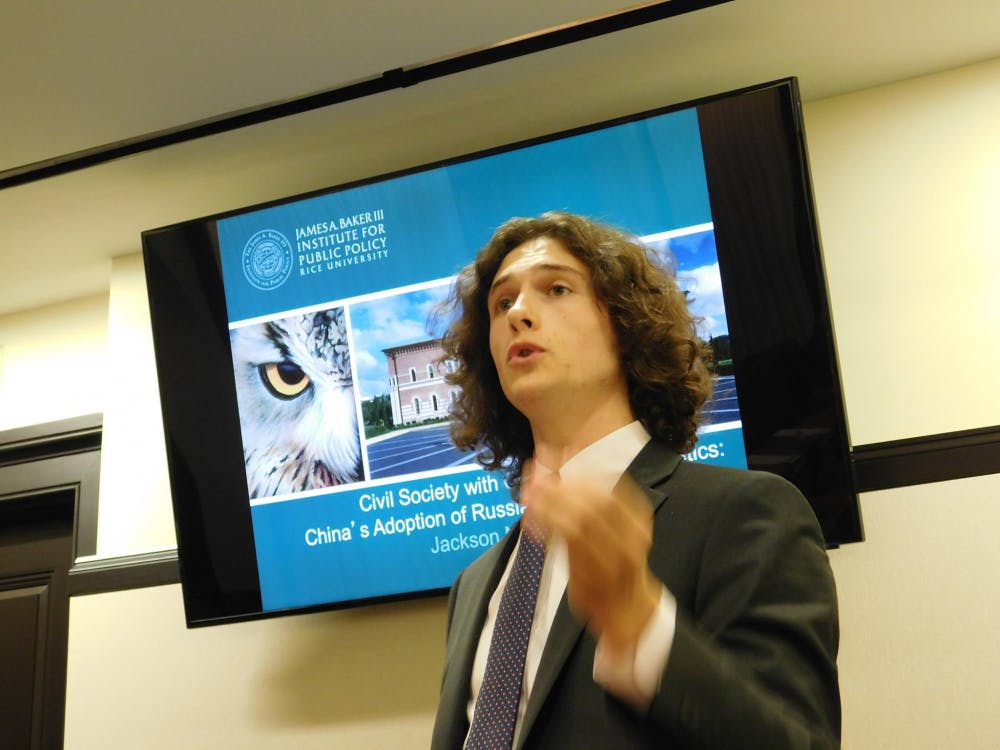Brown senior co-founds Asian studies research journal

Jackson Neagli is a big presence. He stands a head taller than everyone in the room. His smile is a broad grin on the edge of laughter. He tends to push back his mane of shoulder length hair from his forehead and hold it there in a makeshift ponytail with one hand as he gestures with the other. And he’s a very busy man.
Neagli got his summer public policy and legal internships — all three of them — out of the way last spring. His interest in Chinese law and politics had him continuing research for Baker Institute Fellow Stephen Lewis, and writing case studies for a George Washington University professor he interned with in summer 2016. He also tied his long hair back in a conservative man-bun for an internship with Chief Judge Lee H. Rosenthal.
To manage his extracurricular obligations, Neagli became a part-time student, taking only two classes, and split the rest of his time between captaining Rice’s club lacrosse team and developing the inaugural edition of the Rice Asian Studies Review as its editor-in-chief.
Neagli suggested to fellow RASR co-founders, Justin Park (McMurtry ’17) and Aidan McBride (Lovett ’17) that an undergraduate journal for Asian Studies should be the first major project of the Rice Asian Studies Organization, of which they were all members. Neagli is currently president of the organization.
“I had a hunch that because of the research and writing-intensive nature of the Rice Asian studies curriculum, there was probably a pretty substantial repository of high-quality Asian studies research just ‘gathering dust’ on Rice students’ hard drives,” Neagli said.
Ultimately he was right. For a first-time publication, RASR received a flood of submissions: 17, out of which the editorial board chose six to publish. The authors of the selected research hail from all academic disciplines, including anthropology, mathematical economic analysis and biochemistry. This, Neagli says, was the intent.
“Basically, we want to foster a diverse approach to Asian studies, where the meaning of ‘diversity’ is twofold: not only diversity of content (e.g. different geographical regions, phenomena, people, ethnic groups, etc.) but also in terms of approach (i.e. academic discipline),” he said.
The next step for the journal is a flurry of advertising throughout the fall semester and streamlining the editorial process. Park attributed most of the frustration of creating the first issue to authors’ busy schedules.
“While we had hoped to maintain a consistent communication with our authors to successfully work toward improving their submissions before publication, we found that to be more difficult than we expected since so many of our Rice students have enough things going on in their semester,” Park said.
The editorial team was worried they wouldn’t find students or faculty willing to support the new publication but were pleasantly surprised by the response the journal received and the help offered by the Chao Center for Asian studies, which just recently published its first edition of its journal “Transnational Asia.”
When Neagli first mentioned creating the journal, Lewis warned him about the amount of time and effort it would entail.
“Few intellectuals have the patience and intelligence to create an academic journal--I certainly do not-- but Jackson is just the type to take it on,” Lewis said. “I imagine this will be a lifelong interest of his, and can picture him becoming the editor of a law school review, or of an academic journal.”
Submissions to RASR are restricted to Rice undergraduates, but Neagli isn’t against collaboration with other universities.
“In the long term, we hope to partner with other undergraduate Asian studies journals to sponsor conference-style events where students can present on their research,” Neagli said.
Park describes Neagli as “an expert in China, energy and everything in between.” Neagli’s selection for the journal is modestly placed second-to-last and contains 2.5 pages of citations and notes as well as seven graphs. In the article, “A Strategic Sham: Explaining Beijing’s Feigned Interest in Iranian Oil and Gas Resources,” Neagli lays out an argument for the possibility that China’s interest in developing oil and gas extraction projects with Iran is in fact a ruse to lower gas prices.
This semester, his research with Lewis will focus on the relationship between the content and frequency of Chinese subway advertisements to pollution levels in Chinese cities. Lewis and Neagli have worked together on a number of projects since October 2015, including an essay about the benefits of cooperating on energy and space policy between the United States, China, and Russia that was recently published in a journal put out by a Chinese government think tank. Lewis describes Neagli as tenacious and curious, and says he is one of the top student researchers he’s worked with in his 20 years at Rice.
“[Over the time I’ve known him] he's learned to temper his curiosity and create a plan whereby he can explore a problem intellectually, but only up to a point, eventually moving on or, as they say, ‘pulling the trigger,’” Lewis said.
The case studies Neagli wrote last semester totalled approximately 45,000 words — nearly the same size as Ray Bradbury’s novel “Fahrenheit 451.” His research covered Chinese domestic political reform. Neagli studied Chinese policies, sometimes in their original Mandarin, to see how they changed throughout the citizen consultation process. In citizen consultation, drafts of laws are published online and Chinese citizens can comment on them before the laws are revised or passed. It’s fitting that Neagli’s research is the size of a small novel: his case studies will be incorporated into a book being written by GWU professor Steven Balla.
Neagli’s interest in China is not purely intellectual fascination; he spent four years of his childhood living in Hong Kong, where he attended Hong Kong International School. The geographic centrality of Hong Kong made it a convenient stepping-off point for traveling through Asia. Neagli remembers Cambodia, India, Thailand and Tibet as particularly enjoyable trips. He also started studying Mandarin, which he points out is ironic given that Hong Kong’s predominant language is Cantonese. When he came back to the United States in 6th grade, he continued the Mandarin courses through high school, and completed 400-level Chinese courses during his sophomore year at Rice.
“It was an incredible opportunity to be exposed to people and places so extremely different from me — both through international school and through travel--at such a young age,” Neagli said.
The experience won’t simply be cocktail chatter. Neagli has already made Chinese law and politics the focus of his time at Rice, and he plans to make Chinese law his career.
Now he returns from an eight-week stint at Middlebury College, where the only language he could speak was Mandarin. Even after studying Mandarin since second grade, Neagli hesitates to call himself fluent. He aims to eventually master both the language and the culture of China — indeed, he has to, if he wants to make a living there.
“My goal is to become totally fluent, hopefully to the point where I'll be able to practice law in China in Mandarin,” Neagli said.
After graduation, he hopes to land a paralegal internship in a law firm or local Harris County government office. Law school will hopefully follow — and before that, a Master’s program in China that he thinks might finally tip him over the edge into fluency, both in language and in Chinese culture.
With only one semester left at Rice — he plans to graduate in December — he’ll return to life as a full-time student. Between coaching lacrosse, acting as editor-in-chief of RASR and continuing his research, he will stay a very busy man.
More from The Rice Thresher

‘An investment in our future’: Meet Ruth López Turley
Ruth López Turley, director of the Kinder Institute for Urban Research, doesn’t have it easy. She oversees all of the organization’s research operations, raises the money to fund its work and describes herself as constantly in meetings. On top of that, she’s still teaching in her role as a Rice sociology professor. When López Turley thinks about hard work, however, she doesn’t think of jobs like hers.

Trans students at Rice talk difficulties, community
What is community? For Marina Klein, it’s little queer people in your phone, chatting and exchanging compliments and advice in a GroupMe. “[People in the group chat are] so supportive … they’re always there for you when you need them to be,” Klein, a McMurtry College sophomore, said. “You can be there for them when you have the time as well, because that’s how community works.”

Diving into the DEEP with Rice’s Data Science Club
Data Education and Exploration Program is an annual data science showcase competition put on by Rice’s Data Science Club, open to all levels of coding experience. According to Vinay Tummarakota, president of the Data Science Club, the program consists of a semester-long workshop series that alternates between lessons where senior Data Science Club students teach curriculum, and application-style workshops where mentors help students apply skills learned the week before. Over the course of the fall semester, student teams develop projects on their chosen data set, and eventually present in a final showcase.

Please note All comments are eligible for publication by The Rice Thresher.